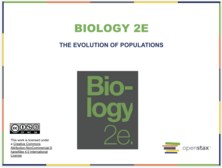Description
- Overview:
- People did not understand the mechanisms of inheritance, or genetics, at the time Charles Darwin and Alfred Russel Wallace were developing their idea of natural selection. Scholars rediscovered Mendel’s work in the early twentieth century, and over the next few decades scientists integrated genetics and evolution in what became known as the modern synthesis—the coherent understanding of the relationship between natural selection and genetics that took shape by the 1940s. Natural selection can affect a population’s genetic makeup, and, in turn, this can result in the gradual evolution of populations. In the early twentieth century, biologists in the area of population genetics began to study how selective forces change a population through changes in allele and genotypic frequencies. Adaptive evolution is the process by which natural selection increases the frequency of beneficial alleles in the population, while decreasing the frequency of deleterious alleles.
- Subject:
- Biology
- Level:
- College / Upper Division, College Credit Plus
- Material Type:
- Module
- Provider:
- Ohio Open Ed Collaborative
- Date Added:
- 05/22/2019
- License:
-
Creative Commons Attribution Non-Commercial Share Alike

- Language:
- English
- Media Format:
- Text/HTML
Standards
Evaluations
No evaluations yet.


Comments